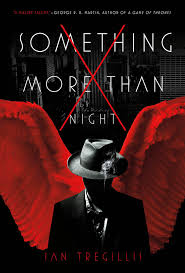Something More Than Night by Ian Tregillis (2013)
This book.
This amazing, beautiful, brilliant book.
If you’re anything like me (a ravenous devourer of books), you have, in your lifetime of reading, come across That Book: the book that you would sell your [insert invaluable possession] to have written. Not because it’s famous or because it would have made you lots of money, but because it is so exquisite that the mere thought that something so wonderful could have come out of your brain is enough to almost make you weep.
For me, this is one of those books.
Consider the opening lines:
They murdered one of the Seraphim tonight.
Gabriel streaked across the heavens like a tumbling meteor, his corpse a fireball of sublimated perfection. He had been a creature of peerless majesty, but now the throes of his death etched the firmament.
His wings, all six, shed embers of incandescent grace as his skidded across the night sky. And when he opened his mouths to scream, the Earth could do naught but shudder. The roar of his lion’s visage registered a 5.2 on the Richter, six hundred miles east of Kyoto. The bellow of his ox’s muzzle roused a dormant volcano in Hawaii. The shriek of his eagle aspect crumbled chimneys in Seattle. The inaudible cry from his human face left people from Melbourne to Perth weeping in troubled slumber, dreaming of colors that no longer existed and sounds that hadn’t been heard since the Earth was just magma and poison. Meanwhile, turbulence roiled a cloud of dark matter sleeting through the solar system.
How does that grab you?
I do so hate to sound sycophantic, but I am enthralled by this book. Nearly every sentence is a symphony. Of the many, many thousands of books I have read in my lifetime, not one has performed miracles of metaphor and world-building to rival SMTN. It would not be an exaggeration to say that this book changed something inside me, as if I had been slightly out-of-tune without knowing it and this book realigned me with the universe. The effect was so palpable and dramatic that I was tempted to start going door-to-door, asking, “Pardon me…do you have a moment to talk about this Really Good Book?” like some sort of literary evangelist. (In fact, if you ask my friends, that’s pretty much what I’ve been doing to them since I first read it. I’m afraid I might have been a trifle obnoxious about it, but once you’ve heard the Good News, you just want to share it with everyone you know.)
If this sounds like hyperbole, please, hear me out.
I was hooked on the basic premise of the book before I even had a chance to swoon over the language: someone has murdered the Angel Gabriel, and a chain-smoking, booze-swilling, nearly-fallen angel named Bayliss–who talks, acts, and thinks exactly like Philip Marlowe–wants to know who and why and how. So, it’s a hard-boiled detective novel…set in Heaven.
And what a Heaven. It’s Thomas Aquinas’s vision of Heaven, according to the book jacket (well, the publisher’s synopsis, since ebooks don’t really have “book jackets” per se anymore). I don’t pretend to be any kind of an expert on that topic, but you don’t have to know anything about it to thoroughly enjoy every aspect of this book. Don’t worry–Tregillis (or Bayliss) will explain it all to you. By the end, you’ll be something of an expert on Magisteria, the Pleroma, the Mantle of Ontological Consistency (MOC for short), METATRON, and so forth. Tregillis is a physicist, which explains a lot–the book is crammed full of capital-S Science. It’s like the beautiful, twisted love child of a physics book, Aquinas’s Summa Theologica, and Dashiell Hammett. God is in the subatomic particles. There is no room in this text for the false dichotomy between faith and science; Tregillis knows that one does not necessarily preclude the other.
The novel features two narrators: Bayliss, the aforementioned angel who is something of an outcast, and Molly, the unlucky (or lucky) human who gets drawn into Bayliss’s investigation into Gabriel’s death–and the extremely complex power struggles and politics of the Heavenly Choir, all of whom act like a bunch of squabbling preschoolers fighting over who gets the best toys and who has the prettiest Magisterium. As if the stakes of trying to find out who killed Gabriel and why weren’t high enough, there’s a long game at work here too–one that Bayliss and Molly and all of humanity play a part in–and the whole of eternity is on the line. Molly and Bayliss narrate alternating chapters, detailing their separate but parallel investigations into what happened to Gabriel. Molly is fascinating; her reaction to the circumstances that get her involved seem realistic enough, and though at first she functions as a reason for Bayliss and others to explain How Things Work, she is so much more than that. She’s smart and capable and impressively dynamic. I like Molly a lot.
And about that ending–I’ve heard and seen complaints about it. For my part, I like it and don’t think it detracts from the whole. I’ll grant that It might have been executed a bit more smoothly, but to me it works just fine on the levels of both story structure and theme. No spoilers from me, though–you’ll have to read it and judge for yourself. If you’re anything like me, though, you won’t want it to end where you get there.
The only other consistent complaint that I’ve seen about SMTN is that it’s “too smart.” Perhaps I’m not a good judge of whether something is “too smart”; I’m a smart person who likes a wide range of books. And this is certainly not the novelization of Grown Ups 2. It’s a smart book; there’s no doubt about it. But if you’re a reader, I doubt you’ll find this book too much to handle. In fact, I found it intellectually stimulating and invigorating. If you like your hardboiled detective fiction with generous sides of physics and thinky thoughts, run–don’t walk–to get your mitts on this one.
One part hardboiled detective fiction, one part metaphysics text, SMTN is transcendent and unlike anything I’ve ever read. If you read one book on my recommendation, let it be this one. (And then hopefully you’ll see that I have impeccable taste and read more of my recommendations.)
MY RATING: 5 out of 5 stakes

